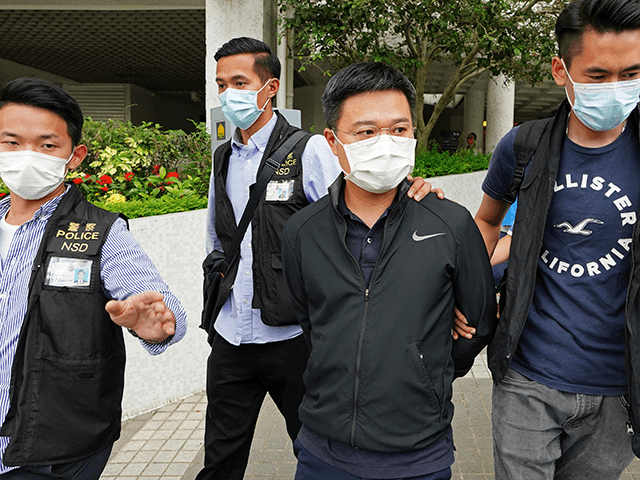Hundreds of Hong Kong police officers descended upon the offices of leading pro-democracy newspaper Apple Daily on Thursday, arresting its editor in chief and four other senior executives on charges of violating the island’s Beijing-imposed “national security law” by “colluding” with foreign powers.
Apple Daily founder Jimmy Lai is already in prison, having been sentenced to 14 months in May and then “re-arrested” and given additional time after he was jailed. Lai was originally sentenced for participating in “unauthorized” protests in 2019. He was given additional time for “colluding with foreign forces” to help twelve refugees attempt to escape to Taiwan by boat in August 2020.
Police arrested five Apple Daily executives in the Thursday raid, including Editor-in-Chief Ryan Law; Associate Publishers Chan Pui-man and Cheung Chi-wai; Cheung Kim-hung, CEO of publisher Next Digital; and Next Digital’s chief operating officer, Royston Chow.
A Hong Kong security official said the raid, which involved about 500 police officers, was launched in response to some 30 articles published by Apple Daily since 2019 that supposedly provided “strong evidence” of foreign collusion because they urged sanctions against the Chinese government for human rights abuses.
Officials said they froze $2.3 million in assets belonging to Apple Daily and affiliated companies in concert with the raid. Apple Daily said these assets included dozens of computers loaded with “considerable journalistic materials.”
China’s state-run Global Times approvingly quoted an Orwellian statement from the Chinese government that insisted the communists would respect Hong Kong’s limited autonomy and the free-speech rights guaranteed to its citizens as long as they do not jeopardize national security by criticizing the government:
The statement stressed that the Basic Law guarantees Hong Kong residents can enjoy freedom of speech, press and publication, but none of the rights and freedoms are borderless, and cannot cross the bottom line of national security, which is also a clear stipulation of relevant international conventions and a general rule in the legal practices of various countries.
Hong Kong is a society under rule of law. Everyone is equal, including media organizations. The freedom of the press is not a “shield” for illegal acts, the Liaison Office said.
Apple Daily responded to the raid with a grimly defiant letter to its readers that vowed to resist the “unprecedented crackdown by the regime.”
“This is the worst of times in Hong Kong,” the editorial said. “Hong Kong’s press freedom is now hanging by a thread.”
The editors denied there was anything criminal or seditious about the reporting that triggered the punitive raid:
History will pass judgement on today’s accusations against Apple Daily. In an era where the regime can draw arbitrary red lines, the staff of Apple Daily will remain in their positions and report the truth for Hong Kong people in a legal, reasonable and fair manner.
The responses of other countries and agencies to the situation in Hong Kong and China are facts disclosed to the public and visible to the world. Reporting them truthfully to Hong Kong people is to realize the promise we made in the editorial of our first edition: “We have confidence in the penetrating power of information technology because we believe darkness will not overcome the light. Whether it is Hong Kong or any corner of the world, the penetrating power of the media is the greatest guarantee of freedom and stability.”
“We will continue to persist as Hongkongers and live up to the expectations so that we have no regrets to our readers and the times we are in,” the editors declared.
Another Apple Daily article on Thursday quoted Jamestown Foundation senior fellow Willy Lam speculating the paper was raided to impress Beijing with the “political achievements” of its Hong Kong puppet government ahead of the Chinese Communist Party’s centennial in July.
The first anniversary of the draconian “national security law” arrives at the end of June, and Apple Daily’s 26th anniversary is only three days away. Lam thought the timing was propitious for Hong Kong government to demonstrate its enthusiasm for the national security law, “in the hope that Beijing will be satisfied with its efficiency.”
The raid will certainly also have a powerful “chilling effect” on other Hong Kong publications by demonstrating that “they cannot challenge the authority of the Hong Kong government and especially that of the central government,” as Lam put it.
Another troubling observation about the raid came from opposition Civic Party chairman Alan Leong, who said the national security law has become a self-contained legal system running in “parallel” to common law, a “one-stop shop” with its own enforcers and judges.

COMMENTS
Please let us know if you're having issues with commenting.